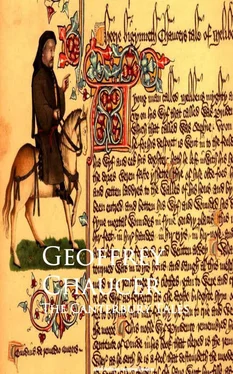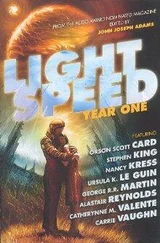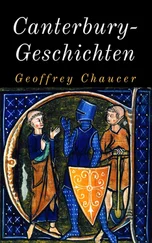Hoom til Athenes, whan the pley is doon;
2965
But shortly to the poynt than wol I wende,
And maken of my longe tale an ende.
2916. Hl. tharme. 2920. how] E. that. 2921. Hn. Hl. popler; rest popelere. 2924. E. fild. 2926. Hl. Disheryt. 2928. E. Cm. Nymphus. 2934, 5, 6. Pt. Ln. than; rest thanne. 2934. E. Cp. stokkes; rest stikkes. 2943. E. om. the. 2945. Hl. tho; rest om. 2952. So all but Hl., which has Thre tymes; see l. 2954. E. place ( for fyr). 2956. E. Hn. And ( for Ne). 2958. E. Hn. lych; rest liche.
By processe and by lengthe of certeyn yeres
(2110)
Al stinted is the moorning and the teres
Of Grekes, by oon general assent.
2970
Than semed me ther was a parlement
At Athenes, up-on certeyn poynts and cas;
Among the whiche poynts y-spoken was
To have with certeyn contrees alliaunce,
And have fully of Thebans obeisaunce.
2975
For which this noble Theseus anon
Leet senden after gentil Palamon,
Unwist of him what was the cause and why;
(2120)
But in his blake clothes sorwefully
He cam at his comaundement in hye.
2980
Tho sente Theseus for Emelye.
Whan they were set, and hust was al the place,
And Theseus abiden hadde a space
Er any word cam from his wyse brest,
His eyen sette he ther as was his lest,
[85: T. 2987-3020.]
2985
And with a sad visage he syked stille,
And after that right thus he seyde his wille.
'The firste moevere of the cause above,
(2130)
Whan he first made the faire cheyne of love,
Greet was theffect, and heigh was his entente;
2990
Wel wiste he why, and what ther-of he mente;
For with that faire cheyne of love he bond
The fyr, the eyr, the water, and the lond
In certeyn boundes, that they may nat flee;
That same prince and that moevere,' quod he,
2995
'Hath stablissed, in this wrecched world adoun,
Certeyne dayes and duracioun
To al that is engendred in this place,
(2140)
Over the whiche day they may nat pace,
Al mowe they yet tho dayes wel abregge;
3000
Ther needeth non auctoritee allegge,
For it is preved by experience,
But that me list declaren my sentence.
Than may men by this ordre wel discerne,
That thilke moevere stable is and eterne.
3005
Wel may men knowe, but it be a fool,
That every part deryveth from his hool.
For nature hath nat take his beginning
(2150)
Of no partye ne cantel of a thing,
But of a thing that parfit is and stable,
3010
Descending so, til it be corrumpable.
And therfore, of his wyse purveyaunce,
He hath so wel biset his ordinaunce,
That speces of thinges and progressiouns
Shullen enduren by successiouns,
3015
And nat eterne be, with-oute lye:
This maistow understonde and seen at eye.
2994. Hn. Ln. that; rest ( except Hl.) that same. Hl. and moeuere eek. 2995. Hl. Ln. stabled. 2997. Hl. alle that er; Cp. alle that beth. 3000. E. Cp. ins. noght bef. noon. Hl. tallegge; Hn. to allegge; Cm. Cp. Pt. to legge. 3006. E. dirryueth. 3007. Hl. Ln. take; rest taken; E. Cm. om. nat. 3008. Hl. ne; E. Hn. Pt. or of; Cm. or of a. 3015. So Hl.; rest eterne with-outen any lye. 3016. at] E. it.
'Lo the ook, that hath so long a norisshinge
(2160)
From tyme that it first biginneth springe,
[86: T. 3021-3058.]
And hath so long a lyf, as we may see,
3020
Yet at the laste wasted is the tree.
'Considereth eek, how that the harde stoon
Under our feet, on which we trede and goon,
Yit wasteth it, as it lyth by the weye.
The brode river somtyme wexeth dreye.
3025
The grete tounes see we wane and wende.
Than may ye see that al this thing hath ende.
3025. E. toures.
'Of man and womman seen we wel also,
(2170)
That nedeth, in oon of thise termes two,
This is to seyn, in youthe or elles age,
3030
He moot ben deed, the king as shal a page;
Som in his bed, som in the depe see,
Som in the large feeld, as men may se;
Ther helpeth noght, al goth that ilke weye.
Thanne may I seyn that al this thing moot deye.
3035
What maketh this but Iupiter the king?
The which is prince and cause of alle thing,
Converting al un-to his propre welle,
(2180)
From which it is deryved, sooth to telle.
And here-agayns no creature on lyve
3040
Of no degree availleth for to stryve.
3034. E. Cm. om. that. 3036. So Hl.; rest That is.
'Thanne is it wisdom, as it thinketh me,
To maken vertu of necessitee,
And take it wel, that we may nat eschue,
And namely that to us alle is due.
3045
And who-so gruccheth ought, he dooth folye,
And rebel is to him that al may gye.
And certeinly a man hath most honour
(2190)
To dyen in his excellence and flour,
Whan he is siker of his gode name;
3050
Than hath he doon his freend, ne him, no shame.
And gladder oghte his freend ben of his deeth,
Whan with honour up-yolden is his breeth,
Than whan his name apalled is for age;
For al forgeten is his vasselage.
3055
Than is it best, as for a worthy fame,
To dyen whan that he is best of name.
[87: T. 3059-3095.]
The contrarie of al this is wilfulnesse.
(2200)
Why grucchen we? why have we hevinesse,
That good Arcite, of chivalrye flour
3060
Departed is, with duetee and honour,
Out of this foule prison of this lyf?
Why grucchen heer his cosin and his wyf
Of his wel-fare that loved hem so weel?
Can he hem thank? nay, God wot, never a deel,
3065
That bothe his soule and eek hem-self offende,
And yet they mowe hir lustes nat amende.
3056. Hl. whan a man. 3059. Hl. Cp. Pt. Ln. ins. the bef. flour.
'What may I conclude of this longe serie,
(2210)
But, after wo, I rede us to be merie,
And thanken Iupiter of al his grace?
3070
And, er that we departen from this place,
I rede that we make, of sorwes two,
O parfyt Ioye, lasting ever-mo;
And loketh now, wher most sorwe is her-inne,
Ther wol we first amenden and biginne.
3071. Hl. that; rest om.
3075
'Suster,' quod he, 'this is my fulle assent,
With al thavys heer of my parlement,
That gentil Palamon, your owne knight,
(2220)
That serveth yow with wille, herte, and might,
And ever hath doon, sin that ye first him knewe,
3080
That ye shul, of your grace, up-on him rewe,
And taken him for housbonde and for lord:
Leen me your hond, for this is our acord.
Lat see now of your wommanly pitee.
He is a kinges brother sone, pardee;
3085
And, though he were a povre bacheler,
Sin he hath served yow so many a yeer,
And had for yow so greet adversitee,
(2230)
It moste been considered, leveth me;
For gentil mercy oghte to passen right.'
3077. your] E. thyn. 3082. Hn. Leen; rest Lene.
3090
Than seyde he thus to Palamon ful right;
'I trowe ther nedeth litel sermoning
To make yow assente to this thing.
Com neer, and tak your lady by the hond.'
[88: T. 3096-3110.]
Bitwixen hem was maad anon the bond,
3095
That highte matrimoine or mariage,
By al the counseil and the baronage.
And thus with alle blisse and melodye
(2240)
Hath Palamon y-wedded Emelye.
Читать дальше












